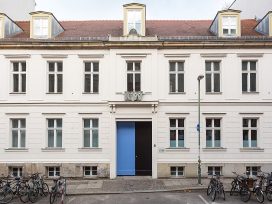
Truth, trust & tricksters
Index on Censorship 3/2025
How AI is changing the nature of censorship; artificial intelligence versus historical truth; revisiting the UK government’s response to 7/7; missing Palestinians from this year’s Berlin Biennale.
In a media world with one eye on the bottom line and the other on the official line, it’s getting harder to publish or broadcast anything that doesn’t promise huge sales and attendant profits, and that doesn’t say or show what is approved. But it’s still possible.
Mindful of the immense influence that television coverage had on the creation of opposition to the Vietnam war, the Bush administration wanted to establish a system of self-censorship in the coverage of the Iraq war and occupation, a system that worked perfectly during the crucial first two years, when much of the press went along with the US government’s lies. (Condoleezza Rice had long since – at least before the war in Afghanistan – summoned the heads of US networks to tell them that the government did not want to see wounded civilians on screen.)
This collaboration was not only in mass media but in publishing. None of the houses owned by the large groups (the top five of which control 80% of general interest books) published a single critical book about the Iraq war and Bush’s foreign policy. The many books that did all came from small, independent firms. It is clear that the conglomerates decided their policy on political rather than commercial grounds, since there was a huge anti-Bush audience (Al Gore had won many more votes than Bush). When the small firm Seven Stories rushed out a little book by Noam Chomsky after 9/11, it sold an unprecedented 300,000 copies in a few weeks.1 As the political situation deteriorated, major US newspapers and large publishers finally began to publish many critical books that then jostled on the bestseller lists.
The importance of independent publishers and magazines is evident, yet the way to set them up and keep them alive is less obvious. Their number has grown impressively in the US and in Europe. In France, dozens of small alternative publishers of literature and poetry, and some political houses, met recently. They all now play an important role taking on authors and subjects that large houses dare not risk. Among them, Agone in Marseille, and Arenes and Amsterdam in Paris, have been crucial. Another house, Demopolis, launches this autumn. These independent publishers have brought out such authors as Chomsky, the US historian Howard Zinn (Agone) and cultural critics such as Judith Butler and Stuart Hall (Amsterdam).
It says much about French publishing that important books used to have to be published in Belgium. Readers of Le Monde diplomatique are familiar with the saga of Eric Hobsbawm’s history of the 20th century, The Age of Extremes, which I published in the US in l990 and which was then translated into dozens of foreign languages, but not French. The major French publishers were all persuaded that there was no room in the bookstores for the work of a former communist. It was only after the intervention of this journal that a Belgian editor, Complexe, took on the book, which went into the French bestseller lists. Something similar happened with a collection of Chomsky’s lectures, Understanding Power. In spite of having sold nearly l00,000 copies in the US, we were not able to find a French publisher until a small independent Belgian firm, Aden, took it on.
Two of the houses mentioned are venturing into magazines this autumn. Amsterdam will launch La Revue Internationale des Livres et des Idées, a French equivalent of the New York Review of Books. Arene is preparing a book length journal that will feature reporting by writers whose own papers no longer give space to lengthy, analytical articles. Patrick de Saint-Exupéry is taking leave from Le Figaro to direct this. These journals will face the same difficulties of distribution and financing as small publishers, but their great advantage is that they do not need to be capital intensive. Large conglomerates may well have access to millions if not billions, but a good list can be built with thousands. A small edition can be done with only a couple of thousand euros, which with luck can be earned back quite quickly. For centuries, publishing was artisanal and can still succeed as such.
The same can be true of newspapers. Oslo boasts l4 papers, major titles plus small offset papers published by different political groups. Most of New York’s papers are small outfits for Asian immigrants. After the liberation of Paris, the city had about 36 papers, although since there were acute newsprint shortages all were limited to two pages.
Most small publishers underpay their staff (Agone’s workers are on the minimum wage) or don’t pay their publisher or chief editor. This is not an ideal situation and it can’t last forever. But it also means that an independent publisher needs only modest support.
Various models been tried around the world. The most famous is Raisons d’Agir, which Pierre Bourdieu started after his studies of publishing proved that the larger houses had severely restrained their political and intellectual content. Bourdieu started his firm in his office in the College de France and he and his assistant were its staff. Many books he published did extremely well, some selling hundreds of thousands. A university space (and a professor’s salary) have been misused elsewhere with excellent results. A primary publisher of European fiction in the US is Dalkey Archive, based at the State University of Illinois, which has granted a professor part time employment to run the press. When we started The New Press we were offered free offices in a dilapidated building at the City University of New York, which saved hundreds of thousands in rent. There is no reason why other universities could not share space in this way. Small towns have handed over old school buildings to publishers, a way in which progressive municipalities could help even if national governments are unwilling.
Another interesting model was tried by Ordfront in Stockholm. This group has built a reader cooperative of 30,000 members paying a modest euro 20 a year for a subscription to one of the best magazines in Sweden, which also allows the publication of a limited number of books a year. If only 10% of members opt for a book, its costs are covered. This experiment has been far more successful than authors’ cooperatives in Sweden and in Germany, which failed to overcome rivalry and jealousy.
The US and Britain have a range of university presses (over 100 in the US, though they account for a mere 1% of books sold). In theory, these could be a vibrant alternative to commercial presses, but they have too often reflected the conservatism of their faculties. They are also under profit-making pressures because universities have followed the capitalist model.
When Pantheon Books in New York, which I directed for 30 years, was faced with the profit demands of new conglomerate ownership, I decided that a not-for-profit publishing house was the only way to continue with a list of uncompromising intellectual quality. We started a university press without a university, which meant we could address non-academic readers. The New Press this year celebrates its l5th anniversary, with 80 titles a year, though many had predicted it could not succeed. But we had the exceptional support of most of my authors over the years and substantial help from many of the more enlightened foundations in the US, which had long ago realised that cultural activity, music, dance, theatre and even intelligent television could not survive in a capitalist context and were willing to see if we could extend their logic to publishing.
This was more possible in the US than in many other countries. But this framework already supports many of Europe’s best newspapers. In Britain The Guardian and its companion Sunday newspaper, The Observer, have long belonged to a non-profit-making foundation, the Scott Trust. The Frankfurter Allgemeine Zeitung belongs to a foundation, as do most of Denmark’s newspapers.
Newspapers and book publishers that belong to independent, not-for-profit foundations or cooperatives may be the best way to preserve political and cultural autonomy. This solution might have saved such major publishers as Le Seuil and Einaudi from being sold to conglomerates whose primary objective is profitability. For centuries publishing averaged an annual profit of 3-4%; the conglomerates want at least l0%, if not l5%, which changes the nature of what can be published.
The German philosopher Jurgen Habermas recently put the case for extending the not-for-profit idea to more newspapers.2 Since Germany’s most important left of centre paper, the Süddeutsche Zeitung (Bavarian, but among the top three dailies) might be sold to a conglomerate, he argued for a government-supported foundation to take it over. His idea has not been widely accepted in Germany, which has unhappy memories of government control. But there have been the successful examples of Arte and France Culture as ways of establishing government support for the media. In France, the film industry and many cinemas have for years enjoyed widespread subsidies without censorship (as far as we know).
Throughout the West, radio and television were initially seen as having an intellectual and cultural role. In the US even the conservative Herbert Hoover decided that all radio stations should be based in universities to avoid commercial control. The BBC was given the benefit of an annual licence fee, directly connected to the sale and use of all radio (and later television) sets, that went directly to the corporation, bypassing governmental control, and is now around £135.50 per household. There is no reason why this could not support independent newspapers and book publishers. A tax on advertising revenue or other sources could assure the economic stability of media free of advertising.
Habermas eloquently argues that a vital democratic debate depends on governmental intervention to guarantee a plurality of views to the public. Sarkozy’s France won’t have this, but there is no reason why the left should not begin to prepare alternatives and new ideas for elections to come. We have seen in the US that such issues can mobilise mass support; over 3m letters, led by NGOs of the left and right, were sent to Congress to protest against Bush’s plans for entrenching conglomerate control.
Many small publishers and magazines are struggling bravely against difficult economic situations, and may in the end lose. There is no reason why their limited resources should not be helped by legislative action. The French state helps new enterprises by supporting up to half their start-up loans, but this support does not extend to cooperatives or foundations. Most publishers could thrive happily under such not-for-profit ownership and there could be alternatives to the decisions that were taken by the owners of Le Seuil or will be taken by the shareholders of the Süddeutsche (both are family owned enterprises as is common in publishing). Conglomerate control has dangerous political and intellectual consequences for media. There is still time to control and reverse this global threat.
To subscribe to Le Monde diplomatique in English, see www.mondediplo.com.
Noam Chomsky, Power and Terror: Post 9/11 Talks and Interviews (Seven Stories Press, New York, 2003).
Translated in Le Monde, Paris, 22 May 2007.
Published 7 November 2007
Original in English
First published by Le Monde diplomatique (English language edition) 10/2007
© André Schiffrin / Le Monde diplomatique (English language edition) / Eurozine
PDF/PRINTSubscribe to know what’s worth thinking about.

How AI is changing the nature of censorship; artificial intelligence versus historical truth; revisiting the UK government’s response to 7/7; missing Palestinians from this year’s Berlin Biennale.

The guarded approach of this year’s Berlin Biennale towards expressions of pro-Palestinian solidarity left artists and art public alike with the sense that what is currently permissible in Germany’s cultural sector is not enough.